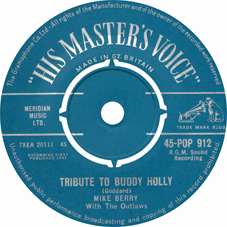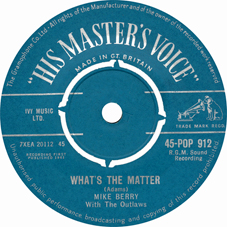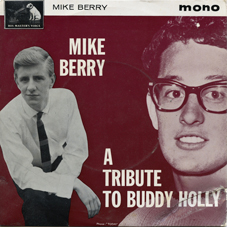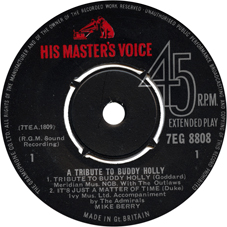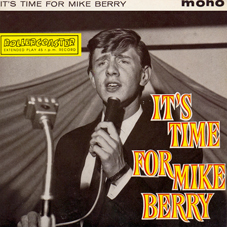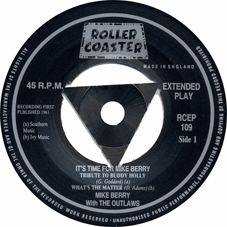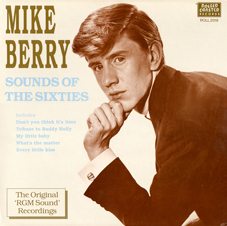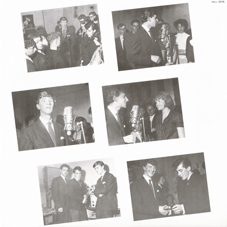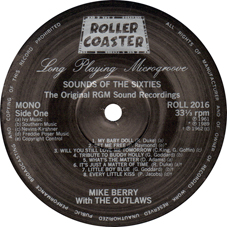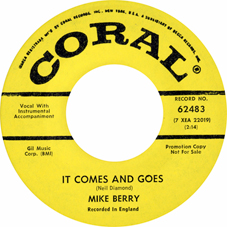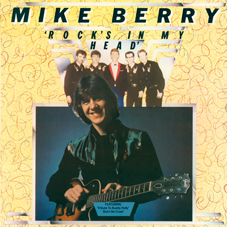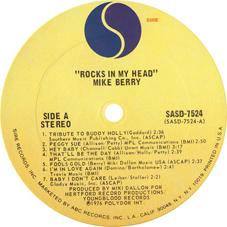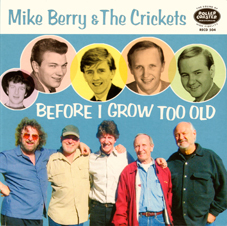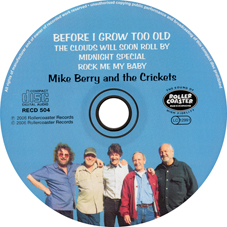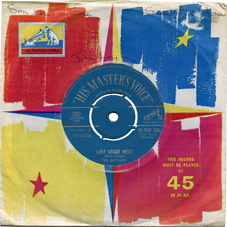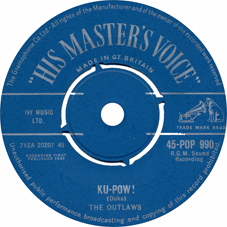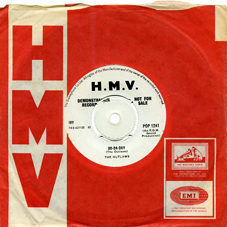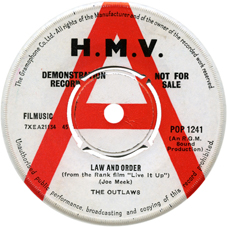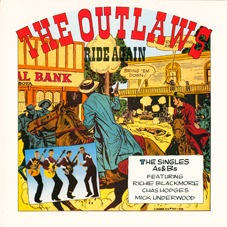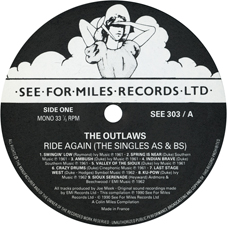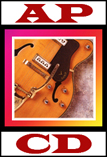When one says 'tribute record', it immediately raises the question of its sincerety and it's understandable since we all know how prompt record companies are to make money even over the remains of a deceased artist. In the fifties, there were countless tributes to Hank Williams for example, and also to Johnny Ace. Most artists who did them were probably honest in their approach but many were certainly guided by their A&R men. When Buddy Holly died in 1959, there were a few songs dedicated to him ; some came from fellow Texans like Ray Campi and Benny Barnes but the most successful at the time came from a West Coast DJ named Tommy Dee who had never met Buddy but, in his own words, 'hit the nail right on the head' because it really rang true, especially when the song was sung by Eddie Cochran. However, because Eddie wanted all royalties from the song to be given to the artists' families, his version didn't see the light of day until 1966 on a British Liberty single.
In the meantime, a young London boy, who was born in 1942 like Paul Mc Cartney if the title of one of his much later songs is reliable, had become such a fan of Buddy Holly that he cut a demo of 'Peggy Sue Got Married' and three other songs with his group in order to find some producer who would be interested in signing them. They were known collectively as Kenny Lord & The Statesmen. The above-mentioned demo was ultimately released in 1985 by Rollercoaster Records whose boss, John Beecher, ran several Buddy Holly Fan Clubs in the early 60's and went on to play a major part in keeping Buddy's music alive. It's easy to imagine why Joe Meek, himself a true Buddy Holly fan at heart, was anxious to sign him when he heard this Buddy Holly-soundalike sometime in 1960.
He kept the singer but not the group, and thus the newly re-christened Mike Berry's career was started.
There's not too much literature about Mike and we have to turn once again to John Beecher who devoted a whole album to Mike Berry in 1989, 'Sounds Of The Sixties', which compiled all his wonderful HMV singles produced by Joe Meek (now lovingly remastered by Boppin' Bob Jones) and featured fascinating notes and photos. A few words about Joe Meek are needed here. Here's another hugely talented man whose professional feats are stunning but whose personal life was a wreck, which ultimately led him to commit suicide after having killed his landlady - on February 3, 1967. He was the first independent British producer in the early 60's and pioneered a number of techniques and sounds that still amaze today, especially if one has a good hi-fi system which enables to dig up all the subtleties populating the various layers of sound in the recordings, be they vocal or instrumental. His vision of how the music should sound was far removed from Phil Spector's but they shared the same endless need to search for innovation and the same preference for mono over stereo. Joe Meek created the world famous 'RGM Sound' which catapulted pell-mell John Leyton, The Tornados, The Applejacks and Mike Berry to fame.
Enter The Outlaws : Billy Kuy (lead guitar), Reg Hawkins (rhythm guitar), Chas Hodges (bass guitar) and Bobby Graham (drums). This is the first line-up of a group who became not only Mike Berry's backing group but the in-house band for countless Meek's productions. The first appearance on vinyl by Mike Berry and The Outlaws occurred in early 1961 with a coupling of 'My Baby Doll' (written by Meek under the 'R. Duke' pseudonym) with a cover of The Shirelles' hit, 'Will You Love Me Tomorrow'. It was a nice cover of the Goffin-King song although Mike's vocal sounded perhaps a bit too contrived, but the flip, a Holly-ish affair with super guitars throughout, was splendid and clearly showed the path Mike wanted to follow. Another number from those early sessions was 'Set Me Free' but it was shelved until being rescued from obscurity on the 'Sounds Of The Sixties' LP ; it was a terrific rocker with a devastating solo from Billy Kuy.
While the Buddy Holly influence would now be prevalent in Mike's recordings, Joe Meek decided that The Outlaws would play country'n'western-styled music on their solo records in accordance with their name. They would go on to have nine exceptional Joe Meek-produced singles on HMV but more on that after Mike's discography below. The next outing for Mike Berry was the poignant and timeless 'Tribute To Buddy Holly'. Since Meek was leasing his product to all the majors, he thought that Mike's records would be better promoted through the EMI group and opted to lease them to HMV from now on. Enter Geoff Goddard. This young songwriter, who claimed supernatural inspiration, had struck a solid relationship with Meek and already provided John Leyton with two big hits in 1961, 'Johnny Remember Me' (#1) and 'Wild Wind' (#2). Another top twenty hit for Leyton ('Son This Is She') would soon come from his pen but before that, Mike Berry had his first one (which rose to #18 in October '61) with Geoff's song about Buddy.
Talk about a grandiose, haunting record, with a mesmerizing organ backing during the coda - and a really sincere tribute - but of course it was deemed controversial to many at the time, including some Holly fans as well as the BBC who refused to play it ! Yet, before releasing it, Joe Meek had invited members of the Buddy Holly Appreciation Society for an advance hearing at his studio at 304 Holloway Road, North London ; he wanted to gain their seal of approval. John Beecher was present and tells that great story in his copious liner notes to the 'Sounds Of The Sixties' LP. I think Dave Laing intelligently reviewed the record in his book, 'Buddy Holly' (Studio Vista, 1971) : 'The song [] makes liberal use of echo to conjure up the appropriate supernatural atmosphere. It also has a neatly played quotation from 'Peggy Sue' in the instrumental break. Berry's voice, like the singing on the best of the later Crickets records, manage to bring Holly to mind without seeming purely imitative. It is deeper and fuller than Holly's voice, so that Berry's nasal intonation sounds different from Holly's'. Prior to that, in 1963, Nigel Hunter undertook Mike's defence in his brave and excellent notes on the back cover of Berry's second HMV EP, 'A Tribute To Buddy Holly'.
It wasn't a hit outside of England but it was judiciously released in the States on Buddy's label, Coral, albeit with a different flip. There was a very good cover version in France by Ronnie Bird under the title, 'Adieu A Un Ami', but only Mike Berry himself was able to equal - or better- the original when he recut it in 1976.
As Dave Laing pointed out, the great quality of Mike Berry was that he sounded naturally like Buddy, he never had to force anything. Even The Crickets, whom Berry joined during their 1962 tour of England, were flabbergasted. The flip of 'Tribute...' was another great track with a guitar solo that just leapt from the grooves. After such a magnifique disc, a follow-up might have proved hard to produce - all the more because the line-up of The Outlaws was suddenly heavily modified : Kuy, Hawkins and Graham were replaced by Roger Mingay, Ken Lundgren and Don Groom respectively - but the whole team succeeded brilliantly with Meek's 'It's Just A Matter Of Time' and one of my own personal favorites, Goddard's 'Little Boy Blue' where Meek's production values are displayed at the highest level : there's density, sublety, guitar sounds to die for and a perfect dosage of echo on Mike's superb vocal part, not to mention a melody which just gotta stick in your mind forever. However, inexplicably, it flopped and Mike had to wait until January 1963 to reach the top ten with a joint Meek-Goddard composition, 'Don't You Think It's Time'. A reviewer wrote at the time of its release : 'Jangling piano and some extremely Holly-ish sounds open the new Mike Berry ditty. We'd love to see this tuneful medium tempo effort in the charts'. It did spend seven weeks there, topping off at no. 6.
Mike's subsequent single, 'My Little Baby', with that very teen-ish line, 'Oom-Pa-Pa-Oom', only reached no. 32 and then most of the following discs didn't even chart at all. He had to wait until 1980 to have another UK top ten hit with the ballad, 'The Sunshine Of Your Smile', on Polydor. 'It Really Doesn't Matter' was the last single to be produced by Joe Meek for Mike. He would still record for HMV until 1967 but production was handled by Robert Stigwood first, and then by John Burgess, who was also involved with Manfred Mann, Cliff Bennett and others. Mike was usually backed up by The Innocents. Not quite easy to find, these later singles do contain some excellent stuff, as evidenced by the 1965 pairing of 'Gonna Fall In Love' and 'It Comes And Goes'. Mike's vocal style was definitely his own and his backings perfectly integrated the musical evolutions of the time. 'It Comes And Goes' is also notable for being an early Neil Diamond composition, and a real good one at that. Neil, who was still a few years ahead of his major breakthrough as a singer, had been part of the Neil & Jack duo on the Duel label and had cut a few solo discs on Columbia and elsewhere but was mainly writing songs for others at that moment.
Mike Berry toured extensively during the sixties. From November 12 to 19, 1961, he was part of the John Leyton Show with Billie Davis, Charles Blackwell & The Beat Boys, Gary Mills and others. In 1962, there was the famous Crickets tour during which Mike almost eclipsed Jerry Naylor ! In 1963, he appeared with Brenda Lee, Tony Sheridan, The Sounds Incorporated and The Outlaws. In 1964, he toured with The Rolling Stones, The Mojos and more. Many of these shows were managed by Robert Stigwood Associates Ltd.
He then progressively turned to an acting career but
kept on recording for our pleasure. In 1976, our wait for some strong stuff representative of his real talent was rewarded with the 'Rock's In My Head' album on the US Sire label which also released several British Rock & Pop compilations as well as new recordings by The Searchers for instance. I must admit that this is the first record I bought by Mike Berry and I still consider it as his best ; it's still a largely unknown gem from that period, a masterpiece that you'll certainly never find listed in Rolling Stone's 500 best albums of all-time !
I can still picture my friend & noted R & R collector, Roger Barnett, literally jumping out of his seat in my music room when I played him Mike's re-recording of 'Tribute To Buddy Holly' ! 'It's better than the original !', he shouted. Yes, it's a bit shorter, the arrangements are spot on (sort of like Joe Meek meets the synthesizer) and, in author Alan Mann's words, 'it allowed him to brush up the lyrics and jettison that irritating opening line, 'The snow was snowin'...'. One of the all-time great remakes of a classic. Backed up by a stellar cast of high grade musicians, including his old colleagues Chas Hodges, Ken Lundgren, Billy Kuy and Clem Cattini from the Joe Meek days, Mike delivered one magic cut after another. There's a hefty dose of Buddy Holly classics, some done by staying close to the original, others done in a more progressive but satisfying manner. 'Rave On' features the same throaty vocal that Buddy used so well, 'I'm Gonna Love You Too' even features a final guitar note which recalls the ending of Holly's original with the sound of a real cricket and his versions of 'Think It Over' and 'Peggy Sue' are superb. Also on the menu are three great originals, all written or co-written by Mike himself : 'For Me & For You' (which could have been an unissued Holly song, really), 'It's All Over (with a rocking piano break) and 'Fool's Gold' (full of crackling guitar sounds), another top favorite of mine. Thanks also to Miki Dallon's immaculate and thoughtful production, this disc should be part of any and all rock collections.
Mike went on to sign a contract with Polydor and enjoyed a string of releases in the 80's. There was also an album titled 'I'm A Rocker' on Epic but I always found the sleeve (front and back) to be most appalling.
He teamed up again occasionally with The Crickets for tribute events down the years and, according to Alan Mann, he finally got to appear at the famous Surf Ballroom
in 1992. There's been several CD releases on John Beecher's Rollercoaster label over the past decade, in particular 'Rock'n'Roll Daze' (RCCD 6002) and 'About Time Too!' (RCCD 3059) which marks the first time Mike Berry has recorded with The Crickets in the studio. The sessions took place in Nashville, Tennessee. Sonny Curtis, Jerry Allison and Joe Mauldin were joined by the super talented Chas Hodges (who alternated between guitar and piano, and who also produced the whole thing) to provide the perfect accompaniment for Mike's vocals. The selection of songs borrowed from Buddy Holly but also from Fats Domino, Warren Smith, Eddie Cochran, Jerry Lee Lewis, Elvis and Bobby Darin, another big influence on Berry. A further track from those exciting sessions - a cover of Buddy's 'Rock Me My Baby' - was only released on a 4-track CD, 'Before I Grow Too Old' (RECD 504), in 2006. Mike Berry must have been in heaven on that occasion but he certainly deserved to finalize this longtime dream. He is one of the classiest vocalists Britain has ever produced - and remains a true rocker at heart.
A SELECTED MIKE BERRY DISCOGRAPHY
| DECCA | |
| F 11314 | Will You Love Me Tomorrow (Goffin-King) / My Baby Doll (Duke) |
| H M V | |
| POP 912 | Tribute To Buddy Holly (Goddard) / What's The Matter (Adams) |
| POP 979 | It's A Just A Matter Of Time (Duke) / Little Boy Blue (Goddard) |
| POP 1042 | Every Little Kiss (Jacobs) / How Many Times (Berry) |
| POP 1105 | Don't You Think It's Time (Goddard-Meek) / Loneliness (Duke) |
| POP 1142 | My Little Baby (Meek-Goddard) / You'll Do It, You'll Fall In Love (Meek) |
| POP 1194 | It Really Doesn't Matter (Meek) / Try A Little Bit Harder (Wilson) |
| POP 1257 | This Little Girl / On My Mind (Berry) |
| POP 1284 | Lovesick / Letter Of Love |
| POP 1314 | Who WIll It Be / Talk |
| POP 1362 | Don't Try To Stand In My Way / Two Lovers |
| POP 1449 | That's All I Ever Wanted From You / She Didn't Care |
| POP 1494 | It Comes And Goes (Diamond) / Gonna Fall In Love (Thomas) |
| POP 1530 | Warm Baby / Just Thought I'd Phone |
| 7EG 8793 | 'It's Time For Mike Berry' Tribute To Buddy Holly/What's The Matter/Don't You Think It's Time/ My Little Baby |
| 7EG 8808 | 'A Tribute To Buddy Holly' Tribute To Buddy Holly/It's Just A Matter Of Time/My Little Baby/ You'll Do It, You'll Fall In Love |
| CORAL (US issues) | |
| 62341 | Tribute To Buddy Holly (Goddard) / Every Little Kiss (Jacobs) |
| 62357 | Don't You Think It's Time (Goddard-Meek) / Loneliness (Duke) |
| 62483 | It Comes And Goes (Diamond) / Gonna Fall In Love (Thomas) |
| POLYDOR | |
| 56182 | Raining In My Heart / Eyes |
| SIRE (US issue) | |
| SASD 7524 | 'Rock's In My Head' Tribute To Buddy Holly/Peggy Sue/Hey Baby/That'll Be The Day/Fool's Gold/I'm In Love Again/Baby I Don't Care/Rave On/For Me & For You/Everybody/It's All Over/I'm Gonna Love You Too/Think It Over/ Don't Be Cruel |
| MCA (US issue) | |
| 40432 | Don't Be Cruel (Presley-Blackwell) / It's All Over (Berry-Dallon) |
| ROLLERCOASTER | |
| RCEP 109 | 'It's Time For Mike Berry' Reissue of 7EG 8793. |
| ROLL 2016 | 'Sounds Of The Sixties' His first seven UK singles plus the unreleased 'Set Me Free'. All mono. |
From '61 to '64, The Outlaws were very busy working both as the house band and as a solo instrumental band for the legendary Joe Meek. And they excelled in both jobs, that's the least that can be said. Their own HMV 45's were designed to give shape to Meek's idea of country'n'western and his dream of the west. Indeed, since the majority of the tunes they recorded were Joe's compositions, the western theme and style of the melodies was well in evidence but with a strong rock'n'roll flavour and an approach which could only be British, the whole thing being stamped with Meek's esoteric - or bold, as Barry Cleveland wrote in his indispensable book - production values. Of course, in 1961, any instrumental outfit had to be influenced by The Shadows and The Outlaws were no exception. But whereas Norrie Paramor was content to capture the majestic sound of The Shads with precision, Joe Meek spent a lot of time to toy with all kinds of funny and original ideas in order to enhance the more aggressive sound of The Outlaws.
Their first single, 'Swingin' Low', could be seen as '1861 - Joe Meek style'. Its flip, 'Spring Is Near', was a fabulous tune and Joe would have quite a few more to offer them, like 'Valley Of The Sioux', Indian Brave' or 'Last Stage West', that last one co-written with Chas Hodges, the talented bass player, who would be the longest running member of the group. The original line-up of Hodges, Billy Kuy (lead), Reg Hawkins (rhythm) and Bobby Graham (drums) appeared on the first three singles only. 'Crazy Drums', where Joe Meek really assembled the whole track from bits and pieces played by each musician, is simply incredible and could be seen as 'See You In My Drums - Joe Meek style' - or perhaps as a rockin' experiment in concrete music !
When 'Last Stage West' was released in 1962, the line-up consisted of Hodges, Roger Mingay (lead), Ken Lundgren (rhythm) and Don Groom (drums). But they were just as good as their predecessors. The gallopping and well-constructed 'Ku-Pow' is one of my own favorites. Yes, there are echoes of Duane Eddy's 'Shazam' in the intro but it's so good that there's no reason to complain ! After one more outing, the very Shadows-like and utterly haunting 'Sioux Serenade', the line-up once again disintegrated - as before, largely on the grounds of dissension with Meek's behavior and tactics. Enter Mick Underwood (drums) and Ritchie Blackmore, the real wild man of The Outlaws. But as a replacement for Mingay on lead guitar, he was yet one step ahead.
On 'The Return Of The Outlaws', with the addition of Geoff Goddard on piano, the group sounded amazingly like The Tornados who had topped the international charts with the timeless 'Telstar' by then. For the next single, they even sang but it was the flip, 'Hobo', which showed the group's prowess ; it was a jazzy piece with a fluid and assured playing by Blackmore over great bass lines from its composer, Chas Hodges. Interestingly, there's a bit of steel guitar thrown in (who played it ?) which vaguely brings to mind some of the stuff played by Speedy West and Jimmy Bryant. During the summer of 1963, The Outlaws backed up Jerry Lee Lewis and Gene Vincent on stage and, near the end of the year, they filmed a spot for the movie, 'Live It Up'. This 'quickie' was shown in the States under the title 'Sing & Swing'. Gene, Heinz, Sounds Incorporated and Andy Cavell & The Saints were also taking part. Needless to say, Joe Meek was musical director for the film. Even Gene sang a Joe Meek number he had cut for Columbia, 'Temptation Baby'. The Outlaws performed another stunner, 'Law & Order', with Blackmore playing an acoustic guitar with lots of reverb. This became their eighth single. Sadly, none of these tracks found their way to the charts.
Way back in 1961, Joe Meek had released an LP by The Outlaws called 'Dream Of The West'. If you own it, you're very lucky because it is very scarce. But you will still need to own the marvelous compilation that Colin Miles put out on his See For Miles label in 1990, called 'The Outlaws Ride Again', with exhaustive notes from Rod Bradford. It brings together in one place all the Outlaws 45's, including the very last one from 1964 which can only be qualified as extraordinary. It is almost a Ritchie Blackmore production, one that turned many heads along the way. Both tracks are vocals and they rock - they even rock hard ! Their take on Little Richard's 'Keep A Knockin' features three scorching soli from Ritchie, totally wild, totally unbridled and totally unlike anything else at that time. But wait a minute ! Play the other side, 'Shake With Me', written by Meek under the 'Jacobs' pseudonym, and you'll be treated to a lengthy solo midway which is pure heavy metal before its time. Ritchie's runs on the neck and his inventiveness are mind-boggling. Now, I'm not a fan of Ritchie's later group, Deep Purple, or of heavy metal in general, all on the contrary, but what Blackmore achieved there, in 1964, is of historical importance nevertheless. Rumor has it that even Jimi Hendrix was flabbergasted when he heard it !
With the exception of that last '45, the delectable music of The Outlaws was rather typical of its frame of time but the production was not. However, Joe Meek was astute enough to not destroy the melodic charm of the songs despite all the effects he applied to the session tapes.
What can be said in the end is that Joe Meek was very fortunate to have such fantastic musicians at his disposal. It's another similarity with Phil Spector who could rely on the famous Wrecking Crew to help him materialize his vision of music.
THE OUTLAWS DISCOGRAPHY
| H M V | |
| POP 844 | Swingin' Low (Raymond) / Spring Is Near (Duke) |
| POP 877 | Ambush (Duke) / Indian Brave (Duke) |
| POP 927 | Valley Of The Sioux (Duke) / Crazy Drums (Duke) |
| POP 990 | Ku-Pow (Duke-Hodges) / Last Stage West (Duke) |
| POP 1074 | Sioux Serenade (Hayward) / Fort Knox (Hodges) |
| POP 1124 | The Return Of The Outlaws (Meek) / Texan Spiritual (Goddard) |
| POP 1195 | That Set The Wild West Free (Meek) / Hobo (Hodges) |
| POP 1241 | Law And Order (Meek) / Do-Da-Day (The Outlaws) |
| POP 1277 | Keep A Knockin' (Penniman) / Shake With Me (Jacobs) |
| CLP 1489 | 'Dream Of The West' (LP) |
| PARLOPHONE Houston Wells & The Outlaws |
|
| R 5141 | Galway Bay (Colahan) / Livin' Alone (Wells) |
| SEE FOR MILES | |
| SEE 303 | 'The Outlaws Ride Again' (LP) Their nine HMV singles. All mono. |


